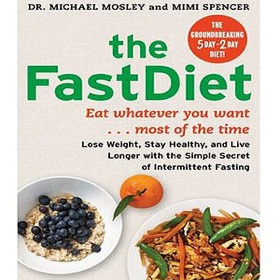'The Fast Diet' Promotes 2 Days Of Fasting Per Week
The Fast Diet, the fasting regimen outlined by Dr. Michael Mosley and Mimi Spencer in a recent book, outlines a new diet that requires its adherents to fast twice a week.
Otherwise known as the 5:2 Diet, the Fast Diet, entails eating normally five days out of the week, and eating 500-600 calories (roughly a quarter of one’s average daily intake) on the two remaining days.
"It's not really fasting. It's just a break from your normal routine," Mosley, a London-based doctor who dropped 20 lbs. in a few months on the diet told People. "It's not like an ordinary diet where you think about it all the time. The joy is that you get on with your ordinary life."
According to the authors of the diet, it’s perfectly safe and wonderfully effective. They claim that fasting will enable your body to feed on its fats stores. Mosley and Spencer also maintain that intermittent fasting is not akin to starvation, and that it’s preferable health-wise to calorie restricting diets. Other benefits of the Fast Diet that they tout in their book include: better memory, increased brain cell production, improved mood, increased insulin effectiveness, longer lifespans and even a lower rick of cancer.
A diet as extreme as the 5:2 diet is, of course, not without its detractors. "Five hundred calories a day is potentially dangerous," says Dr. David L. Katz, director of Yale University's Prevention Research Center. "There is some risk of slowing your metabolic rate. You'll probably have a headache and feel distracted."
Lisa Moskovits, a registered dietitian in Manhattan, told Business Insider. "There is limited evidence that shows a few days of calorie restriction will have any better results than following a moderately restricted calorie diet on all days of the week.”
There’s also concern that fasting on certain days will cause binge eating on the days that follow them.
RELATED ARTICLES
Get the most-revealing celebrity conversations with the uInterview podcast!






Leave a comment